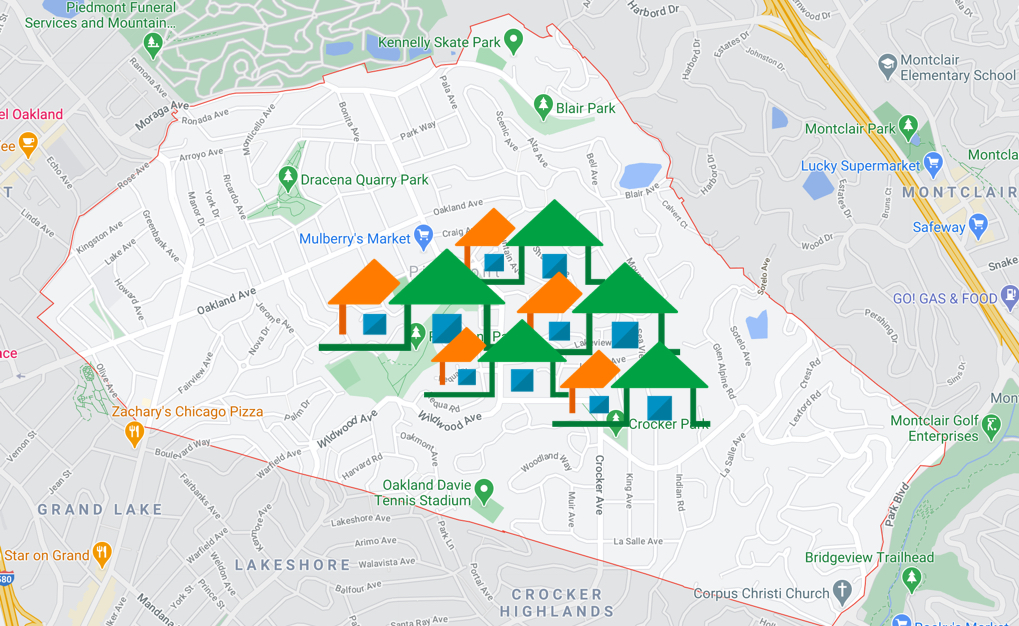Saying an appeal would likely be fruitless, city leaders Monday night said they will instead continue to prepare for Piedmont to accommodate 587 new residences in the city during the eight-year 2023 to 2031 state-mandated new-housing cycle period.
The City Council thus concurred with a recommendation by city staff, including the city attorney, that the time and expense of pursuing an appeal of Piedmont’s draft 2023-2031 Regional Housing Needs Allocation — with the goal of getting that 587 number reduced — would not be worth it, especially since it likely wouldn’t succeed.
“The time, effort and expense of pursuing an appeal would be better directed toward the preparation of a Housing Element Update for the sixth cycle,” Planning and Building Director Kevin Jackson told the City Council. “Instead of appealing its RHNA, Piedmont can show leadership by embracing the effort to meet the housing needs of the Bay Area.”
For many months, council members have said the task of finding places to build almost 600 new homes, and ways to persuade developers to do that, by 2031 is a daunting one that will likely require innovative approaches and sacrifices to achieve. They agreed with Jackson and City Attorney Michelle Kenyon, however, that pursuing an appeal isn’t worth doing.
Piedmont is in the midst of the 2015-2023 Regional Housing Needs Allocation, which in this fifth cycle requires the city to prepare to accommodate 60 new residences.
The city is also well underway with preparations for the sixth and next Regional Housing Needs Allocation cycle, covering 2023 through 2031, and the long-anticipated (and now final) number of new residences the city will have to prepare to accommodate during that eight years in 587. Of those, 163 should be for very-low-income, 94 low-income, 92 moderate income and 238 above-moderate income (luxury) residences.
Between August 2020 and April 2021, Piedmont sent seven letters to the Association of Bay Area Governments detailing various concerns about the methodology and data used for the draft 2023-2031 Regional Housing Needs Allocation. Those letters include contentions that the much higher numbers for Piedmont and other small cities “vastly exceed 30-year regional growth forecasts” in those cities because of limited available land and other factors; that basic information about the assumptions used to develop the numbers has not been provided to Piedmont and other cities; and, in an Aug. 27, 2020 letter, contends the larger allocations disproportionately shifts the regional housing need to small communities like Piedmont that have little or no transit infrastructure, significant threat of wildfires and small employment bases.
Kenyon told Councilwoman Conna McCarthy it could cost $10,000 to $20,000 to see an appeal through, successful or not. And Jackson also pointed out that very few such appeals have succeeded over time, and that those that did have done so only partially. It was also noted Monday night that if other Bay Area cities win such an appeal and get their allocation numbers reduced, those numbers could increase in Piedmont (or any other city).
The Bay Area’s total 2023-2031 number is 441,176 housing units.
Kenyon told the council that the state, or others, could conceivably sue Piedmont should it not be able to prove it can accommodate 587 (or other final number should it chnge) new residences, but that there are no penalties if all those residents aren’t built, as cities can’t force developers to plan or build.
Irene Chang, co-chair of the Piedmont Racial Equity Campaign’s housing committee, said the city shouldn’t be seeking to reduce that 587 number anyway, and that that number shouldn’t be seen as a burden. Chang said she preferred the term “opportunity for us to enhance progressive planning possibilities,” and mentioned Piedmont’s reputation as a city resistant to change.
“I think this is a good opportunity to send a different message,” Chang said.
Though that 587 figure has indeed been a sticking point for city officials, they have said throughout the housing element process that the state mandates indeed offer a good opportunity for improving equity in Piedmont. Councilwoman Betsy Smegal Andersen said Monday that it offers a chance for the city to make itself stronger.
‘Guiding principles’ for ADUs
Also on Monday, the City Council voted 4-0 to adopt “guiding principles” for new accessory dwelling unit (ADU) programs and incentives to help with implementation of the 2015-2023 Housing Element (the 60-new-housing-unit plan for Piedmont). These guiding principles also include new objective design standards to streamline the construction of multi-family apartment buildings as part of that housing plan.
The principles include supporting “equitable distribution” of ADUs and other affordable units across the city; promoting and enhancing community design, including infill development should be “compatible with the neighborhood context;” facilitating development of new housing units through partnerships between the city and the “broader community:” and developing the new housing with social equity in mind, including possible city incentives and programs to encourage new homes and apartments for a range of income levels.
The partnerships would include trying for “community consensus” on desired structure designs and other aspects of enacting the Housing Element. Such consensus, several people said, could be elusive.
“Consensus doesn’t come easily, and it certainly doesn’t come quickly,” Mayor Teddy Gray King said.
Contact Sam Richards at sam.richards4344@gmail.com

The constrains of the planning Dept. Need to be more clear and less restrictive. We were denied several times for an ADU even though we have plenty of space,, did not ask for any variances or special treatment. We were playing by the rules as they are laid out. Mayor Teddy King is talking out both sides of her mouth. She agrees with the concept of social equity in housing… but given the chance she denigrated our attempts and voted against our appeal.